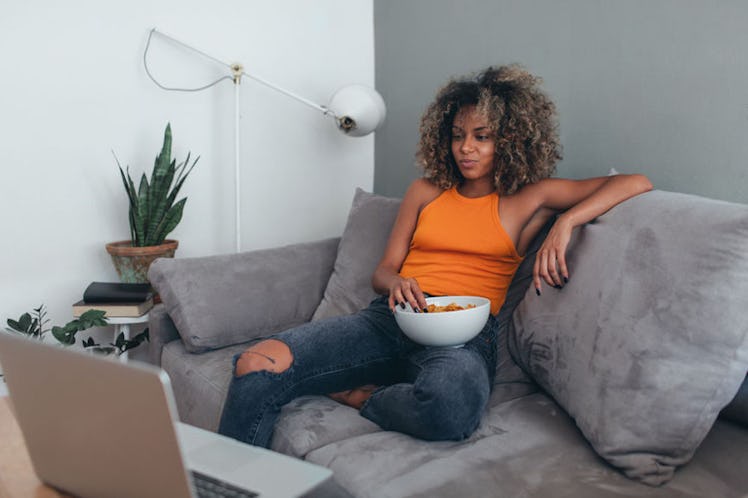
Experts Reveal The Best Times To Snack Throughout The Day To Keep Your Energy Up
Whenever someone asks what my favorite food is, I immediately think of snacks. Obviously snacks are more of a food category, but whenever I see a bowl of hummus just waiting to be eaten, I can't help but think, "Girl, you look like a snack." From chips and guac, to a handful of almonds, to fluffy muffins, to smoothies full of fruit and nut butter, I love it all. If you also love munching around the clock, you might be interested in the best times to snack throughout the day, because according to experts, when you eat — not just what you eat — can have a big effect on your energy levels, and how you feel overall.
Melissa Rifkin, MS, RD, CDN, CSO, a dietitian based in New York City, tells Elite Daily that snacking is definitely not an exact science. It really depends on your schedule, and how your body deals with hunger, she tells me in an email.
That being said, Rifkin has some suggestions for when to know if it's time to fuel up. "I recommend snacking if you need to, meaning if you're not hungry or you know you're eating your meals every four hours, then perhaps a snack isn't necessary," she explains.
For anyone who feels like the time between lunch and dinner is an eternity (aka me), Rifkin recommends figuring out what munchies keep you satisfied. "I recommend meals every four to six hours, and snacks in between (for example breakfast at 7:30 a.m., snack at 10:30, lunch 12:30)," she says. And, of course, if you feel hungry during the day, you should never feel like you shouldn't eat, regardless of how many meals or snacks you've already had. Rather, it might just be best to figure out whether the last meal you had actually gave your body all of the nutrients you needed to stay energized for as long as possible.
In fact, getting a good balance of nutrients into your body is especially important if you tend to snack on lots of smaller foods throughout the day, rather than eat fewer, larger meals — which, BTW, a fair amount of people do on a regular basis. A Nielsen survey of 30,000 people in 60 different countries found that 45 percent of global respondents will sometimes replace a meal with snacks instead. While that might sound a bit surprising, I know that I, for one, have definitely been so busy some days that I've munched on a granola bar instead of taking a full lunch before.
When it comes to snacking, “protein and fiber help you feel full and satisfied,” Jessica Crandall, a registered dietitian and spokesperson for the Academy of Nutrition and Dietetics, told Real Simple. If you can ensure you're hitting those two things in your snack choices, “you shouldn’t feel the need to grab another snack soon after, and you’ll be less likely to overeat at your next meal.”
While every snack is a good snack in my book, when it comes to the foods that are going to keep you full and satisfied, some are more ahead of the curve than others. "One of the best snack foods I recommend is cottage cheese, such as Muuna," says Rifkin, "because of its low sugar and high protein count." Cottage cheese is also rich in probiotics, Rifkin explains, which helps to keep your digestive tract and immune system healthy.
Basically, when you're putting together a tasty snack, just make sure it's balanced in terms of its macronutrients. Look for foods with plenty of carbs, protein, and healthy fats, suggests Rachel Fine, MS, RD, CSSD, CDN, a registered dietitian and owner of To The Pointe Nutrition, a nutrition counseling firm in New York City. Avocados are an excellent source of healthy fat, for instance, she tells Elite Daily, so try wrapping some avo and turkey (or tofu, if you're veg!) in a whole grain tortilla, and you'll have a balanced, portable snack for whenever you're feeling hungry.